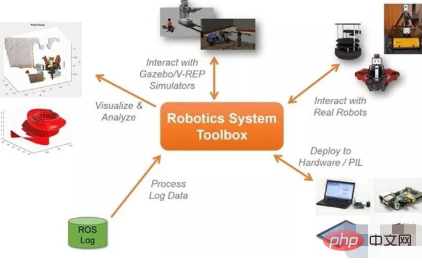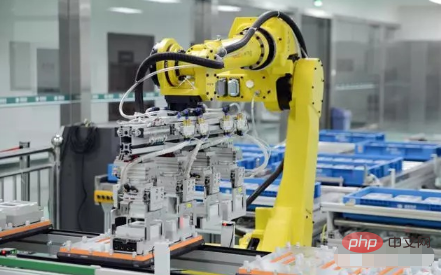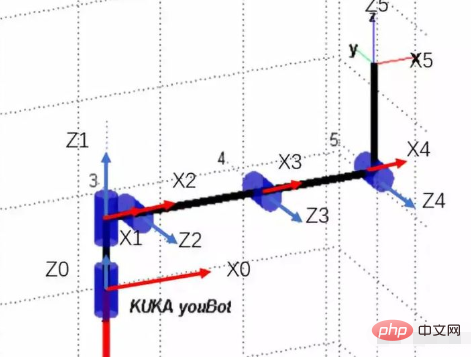What language is used to program industrial robots?
Commonly used programming languages for industrial robots: 1. Hardware description languages (HDLs), generally used to describe electrical programming methods; 2. Assembly language; 3. MATLAB; 4. C#/.NET; 5. Java; 6. Python; 7. C/C.

The operating environment of this tutorial: Windows 7 system, Dell G3 computer.
Commonly used languages in robot programming:
1. Hardware description languages (HDLs)
Hardware description language is generally used to describe electrical programming methods. These languages will be quite familiar to some robotics experts because they are used to programming FPGAs. FPGAs allow you to develop electronic hardware without actually producing a silicon chip, which is a faster and easier option for some developments. If you don't develop electronic prototypes, you may never use HDLs. Even so, it is still necessary to understand this programming language because they are very different from other programming languages. An important point: all operations in HDLs are concurrent, as opposed to the sequential operations of processor-based programming languages.

2. Assembly
Assembly allows you to program on 0 and 1 digits. Basically this is the lowest level programming language. Just recently, the lowest level electrons required assembly to be programmed. With the rise of Arduino and other microcontrollers, you can now easily program at the bottom using C/C. This means that Assembly may become less necessary for most roboticists.

3. MATLAB
MATLAB and its related open source resources, such as Octave, are particularly liked by some robotics engineers and are used to analyze data and develop Control System. There is also a very popular robotics toolbox - MATLAB. I know experts who have developed entire robotic systems using only MATLAB. If you want to analyze data, generate advanced graphics, or implement control systems, you might want to learn MATLAB.

4. C#/.NET
C# is a special programming language provided by Microsoft. I put C#/.NET here mainly because of the Microsoft Robotics Developer Studio. The main development language of this package is C#. If you're going to use this system, you'll probably have to use C#.

5. Java
As an electrical engineer, I am always interested in some computer science degree courses that introduce Java as the first programming language for students. Learn to be surprised. Java hides the underlying storage functionality from programmers, which makes it easier to write than some languages (such as C), but it also means that you will understand less about the running logic of the underlying code. If you have a computer science background and switched to robotics (many people do, especially in research fields), you may have learned Java. Like C# and MATLAB, Java is an interpreted language, which means it is not compiled into machine code. Instead, the Java virtual machine interprets instructions at runtime. Using Java, you can theoretically run the same code on different machines, thanks to the Java Virtual Machine. In practice, this is not always possible and sometimes results in slow code. But Java is very popular in some parts of robotics, so you may need it.

#6. Python
In recent years, there has been a huge resurgence in people learning Python, especially in the field of robotics. One reason may be that Python (and C) are the two main programming languages in ROS. Unlike Java, Python's focus is on ease of use, and Python doesn't require a lot of time to do regular things like defining and casting variable types. These are very common things in programming. In addition, Python has a large number of free libraries, which means you don't have to "reinvent the wheel" when you need to implement some basic functions. And because Python allows simple bindings to C/C code. This means that the performance of heavy parts of the code can be built into these languages, thereby avoiding performance penalties. As more and more electronic products start to support Python "out of the box" (along with the Raspberry Pi), we may see more Python in robots. Note: The Raspberry Pi Foundation: A small charity organization in the UK, established with the purpose of promoting technology rather than selling technology for profit.
#7、C/C
Finally we arrive at the #1 Robot Programming Language! Many consider C and C to be a good starting point for new roboticists. Why? Because many hardware libraries use these two languages. Both languages allow interaction with low-level hardware, allow real-time performance, and are very mature programming languages. Nowadays, you'll probably use C more than C because the former has more features. C is basically an extension of C. It can be useful to learn a little C first, especially if you find a hardware library written in C. C/C is not as easy to use as Python or MATLAB. Implementing the same functionality in C would take a lot of time and would require more lines of code. However, since robotics relies heavily on real-time performance, C and C++ are the programming languages that are closest to the "standard language" for us roboticists.
For more computer programming related knowledge, please visit: Programming Teaching! !
The above is the detailed content of What language is used to program industrial robots?. For more information, please follow other related articles on the PHP Chinese website!

Hot AI Tools

Undresser.AI Undress
AI-powered app for creating realistic nude photos

AI Clothes Remover
Online AI tool for removing clothes from photos.

Undress AI Tool
Undress images for free

Clothoff.io
AI clothes remover

Video Face Swap
Swap faces in any video effortlessly with our completely free AI face swap tool!

Hot Article

Hot Tools

Notepad++7.3.1
Easy-to-use and free code editor

SublimeText3 Chinese version
Chinese version, very easy to use

Zend Studio 13.0.1
Powerful PHP integrated development environment

Dreamweaver CS6
Visual web development tools

SublimeText3 Mac version
God-level code editing software (SublimeText3)

Hot Topics
 1387
1387
 52
52
 Huawei's official introductory tutorial for Cangjie programming language is released. Learn how to obtain the universal version SDK in one article
Jun 25, 2024 am 08:05 AM
Huawei's official introductory tutorial for Cangjie programming language is released. Learn how to obtain the universal version SDK in one article
Jun 25, 2024 am 08:05 AM
According to news from this site on June 24, at the keynote speech of the HDC2024 Huawei Developer Conference on June 21, Gong Ti, President of Huawei Terminal BG Software Department, officially announced Huawei’s self-developed Cangjie programming language. This language has been developed for 5 years and is now available for developer preview. Huawei's official developer website has now launched the official introductory tutorial video of Cangjie programming language to facilitate developers to get started and understand it. This tutorial will take users to experience Cangjie, learn Cangjie, and apply Cangjie, including using Cangjie language to estimate pi, calculate the stem and branch rules for each month of 2024, see N ways of expressing binary trees in Cangjie language, and use enumeration types to implement Algebraic calculations, signal system simulation using interfaces and extensions, and new syntax using Cangjie macros, etc. This site has tutorial access address: ht
 After 5 years of research and development, Huawei's next-generation programming language 'Cangjie” has officially launched its preview
Jun 22, 2024 am 09:54 AM
After 5 years of research and development, Huawei's next-generation programming language 'Cangjie” has officially launched its preview
Jun 22, 2024 am 09:54 AM
This site reported on June 21 that at the HDC2024 Huawei Developer Conference this afternoon, Gong Ti, President of Huawei Terminal BG Software Department, officially announced Huawei’s self-developed Cangjie programming language and released a developer preview version of HarmonyOSNEXT Cangjie language. This is the first time Huawei has publicly released the Cangjie programming language. Gong Ti said: "In 2019, the Cangjie programming language project was born at Huawei. After 5 years of R&D accumulation and heavy R&D investment, it finally meets global developers today. Cangjie programming language integrates modern language features, comprehensive compilation optimization and Runtime implementation and out-of-the-box IDE tool chain support create a friendly development experience and excellent program performance for developers. "According to reports, Cangjie programming language is an all-scenario intelligence tool.
 Huawei launches HarmonyOS NEXT Cangjie programming language developer preview beta recruitment
Jun 22, 2024 am 04:07 AM
Huawei launches HarmonyOS NEXT Cangjie programming language developer preview beta recruitment
Jun 22, 2024 am 04:07 AM
According to news from this site on June 21, Huawei’s self-developed Cangjie programming language was officially unveiled today, and the official announced the launch of HarmonyOSNEXT Cangjie language developer preview version Beta recruitment. This upgrade is an early adopter upgrade to the developer preview version, which provides Cangjie language SDK, developer guides and related DevEcoStudio plug-ins for developers to use Cangjie language to develop, debug and run HarmonyOSNext applications. Registration period: June 21, 2024 - October 21, 2024 Application requirements: This HarmonyOSNEXT Cangjie Language Developer Preview Beta recruitment event is only open to the following developers: 1) Real names have been completed in the Huawei Developer Alliance Certification; 2) Complete H
 Tianjin University and Beihang University are deeply involved in Huawei's 'Cangjie” project and launched the first AI agent programming framework 'Cangqiong” based on domestic programming languages.
Jun 23, 2024 am 08:37 AM
Tianjin University and Beihang University are deeply involved in Huawei's 'Cangjie” project and launched the first AI agent programming framework 'Cangqiong” based on domestic programming languages.
Jun 23, 2024 am 08:37 AM
According to news from this site on June 22, Huawei yesterday introduced Huawei’s self-developed programming language-Cangjie to developers around the world. This is the first public appearance of Cangjie programming language. According to inquiries on this site, Tianjin University and Beijing University of Aeronautics and Astronautics were deeply involved in the research and development of Huawei’s “Cangjie”. Tianjin University: Cangjie Programming Language Compiler The software engineering team of the Department of Intelligence and Computing of Tianjin University joined hands with the Huawei Cangjie team to deeply participate in the quality assurance research of the Cangjie programming language compiler. According to reports, the Cangjie compiler is the basic software that is symbiotic with the Cangjie programming language. In the preparatory stage of the Cangjie programming language, a high-quality compiler that matches it became one of the core goals. As the Cangjie programming language evolves, the Cangjie compiler is constantly being upgraded and improved. In the past five years, Tianjin University
 How to switch language in microsoft teams
Feb 23, 2024 pm 09:00 PM
How to switch language in microsoft teams
Feb 23, 2024 pm 09:00 PM
There are many languages to choose from in Microsoft Teams, so how to switch languages? Users need to click the menu, then find Settings, select General there, then click Language, select the language and save it. This introduction to switching language methods can tell you the specific content. The following is a detailed introduction. Take a look. Bar! How to switch language in Microsoft Teams Answer: Select the specific process in Settings-General-Language: 1. First, click the three dots next to the avatar to enter the settings. 2. Then click on the general options inside. 3. Then click on the language and scroll down to see more languages. 4. Finally, click Save and Restart.
 Demystifying Golang's bytecode: exploring the essence of its programming language
Feb 26, 2024 pm 02:36 PM
Demystifying Golang's bytecode: exploring the essence of its programming language
Feb 26, 2024 pm 02:36 PM
Golang (also known as Go language) is an open source programming language developed by Google and first released in 2007 to improve the productivity and development efficiency of engineers. Golang aims to simplify the complexity of programming languages and provide efficient execution speed while taking into account ease of use. This article will deeply explore the characteristics of Golang, analyze its bytecode mechanism, and reveal its working principle through specific code examples. 1. The characteristics and advantages of Golang are simple and efficient: Golang has a concise grammatical structure and rich
 Huawei's self-developed Cangjie programming language official website and development documents are online, integrating into the Hongmeng ecosystem for the first time
Jun 22, 2024 am 03:10 AM
Huawei's self-developed Cangjie programming language official website and development documents are online, integrating into the Hongmeng ecosystem for the first time
Jun 22, 2024 am 03:10 AM
According to news from this site on June 21, before the HDC2024 Huawei Developer Conference, Huawei’s self-developed Cangjie programming language was officially unveiled, and the Cangjie official website is now online. The official website introduction shows that Cangjie programming language is a new generation programming language for all-scenario intelligence, focusing on "native intelligence, natural all-scenarios, high performance, and strong security." Integrate into the Hongmeng ecosystem to provide developers with a good programming experience. The official website attached to this site introduces as follows: Native intelligent programming framework embedded with AgentDSL, organic integration of natural language & programming language; multi-Agent collaboration, simplified symbolic expression, free combination of patterns, supporting the development of various intelligent applications. Innately lightweight and scalable runtime for all scenes, modular layered design, no matter how small the memory is, it can be accommodated; all-scenario domain expansion
 What should I do if the Microsoft Edge browser does not display images? - What to do if the Microsoft Edge browser does not display images?
Mar 04, 2024 pm 07:43 PM
What should I do if the Microsoft Edge browser does not display images? - What to do if the Microsoft Edge browser does not display images?
Mar 04, 2024 pm 07:43 PM
Recently, many friends have asked the editor what to do if the Microsoft Edge browser does not display images. Next, let us learn how to solve the problem of Microsoft Edge browser not displaying images. I hope it can help everyone. 1. First click on the lower left corner to start, and right-click on "Microsoft Edge Browser", as shown in the figure below. 2. Then select "More" and click "App Settings", as shown in the figure below. 3. Then scroll down to find "Pictures", as shown in the picture below. 4. Finally, turn on the switch below the picture, as shown in the picture below. The above is all the content that the editor brings to you on what to do if the Microsoft Edge browser does not display pictures. I hope it can be helpful to you.




